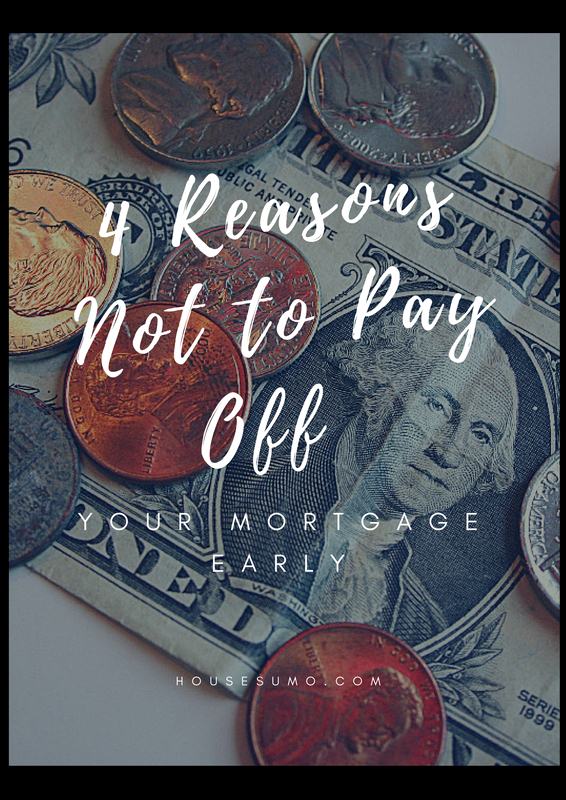This article points out some very common misconceptions (typically based on emotional thinking) regarding why paying off a home early is not a financially savvy thing to do.
As a Graduate with a Finance Major, I’m always amazed when I hear the financial pundits encourage people to focus on paying off their homes early and getting completely out of debt.
But considering the fact that many people are now living into their late 80’s and 90’s, should your real concern be toward eliminating all debt as fast as possible or maximizing your retirement savings?

In addition, what is a better yardstick for determining success: 1) Reduction of debt, or 2) Net worth? In both cases, I believe the latter is the more important gauge.
With that in mind, here are four very pertinent reasons not to pay that home off early:
Read Also:
- Ready to List Your Home for Sale? Ten Tips to Make it More Marketable and Get a Quick Sale!
- Make Your House Picture Perfect for a Real Estate Showing in 40 Minutes (Or Less!)
- Selling Your Home Without a Realtor has Benefits If You’re Up to the Challenge
- Understanding Attorney’s Fees Clauses in Home Improvement Contracts
- Can I Get a Mortgage with Bad Credit in Canada?
Opportunity Cost
As per Freddie Mac, mortgage interest rates have been fairly low at historic terms for quite some time now. At such low rates, it is a golden opportunity to make your money work for you.
Clearly, the only question here is whether the additional money that could be put toward the principal could do better in another investment vehicle.
For those that don’t risk-averse, the historical return of the stock market over the last 20 years (Morningstar) would net you roughly 8%.
Currently, a 30 year fixed mortgage runs approximately 4% and a 15 year fixed mortgage is at 3.25% (Bankrate).
Looking at an after-tax gain on the investment, you would still net out at 6.4% (assuming the 20% capital gain rate), so it’s clearly a better way to go. Of course, this is just for someone doing straight investing in the market.
A better way to go would be to invest in a pre-tax vehicle such as a 401K (assuming that’s available to you).
Now your taxable event wouldn’t happen until retirement when you are at a lower income level (and hopefully a lower tax rate, although no one can say for sure what taxes will be in the future).
In addition, you have now reduced your taxable income, so you earn 8%, and you also save money by not paying the additional taxes.
For example, if Average Joe makes $50,000 a year, contributes $5,000 to his 401K and has an effective tax rate of 15%, his pre-tax net gain would be $1,150 ($400 earned and $750 in tax savings). If that $5,000 was used to pay down the principal on a 4% loan, he only saves $200 in interest.
And if you are risk-averse and don’t feel comfortable putting the money in the market, many 401Ks have fixed-income investments that will net you a small percentage (similar to a CD).
If you were earning 1% on a fixed investment vehicle, you would still be better off as you would have a net gain of $800 ($50 earned and $750 in tax savings) versus the $200 in interest saved, and of course no risk.
The counter-argument would be that you are still paying taxes at an ordinary income rate when you make your required minimum distribution in the future, and that is correct. But clearly, you have an opportunity to use the tax savings in the present to earn more money, putting you ahead in the long run.
Inflation
Assuming you have a fixed-rate loan, the one constant you will have for the duration of your loan is your monthly payment. So while goods and services increase in price (and median income rises), your home loan will not. The value of $1 in 1994 has the same buying power as $1.8 in 2018 (Bureau of Labor Statistics).
Clearly, it is better to pay off your home with future dollars since your loan is a constant. Most of the people also don’t know that you can get an IVA when you’re in a mortgage. Some expert lenders offer mortgages to people with an IVA.
Peace of Mind
I have heard it said that paying off a loan early gives one the peace of mind to sleep comfortably at night. This is the main point of contention by the naysayers who choose not to invest their additional money. I often scratch my head at this misnomer.
For those that are financially savvy, that move should give you nightmares and keep you up at night. Although financial advisers have given a wide array of opinions on how much to save for retirement, the range is typically somewhere between 60%-80% of your annual income x remaining life expectancy.
The current life expectancy in the United States is 78.74 years (Center for Disease Control) and many now live into their mid 80’s and 90’s.
Most people that do the math are pretty shocked at how much they really need to save to guarantee they don’t outlive their retirement savings.
Having your money work for you as long as possible is of the utmost importance when you truly take into account your lifespan.
Of course, it goes without saying that you should have a certain degree of liquidity set aside in the event of emergencies and unforeseen circumstances.
Realistically, a major catastrophe could pretty much cause anyone to hit a reset button (and that includes people that have a house paid off).
It’s not inconceivable that a major medical emergency or a long bout of unemployment could cause people to sell a home (and unfortunately, I’ve seen this first hand and at a very inopportune time).
No emergency fund can protect you from every situation and life itself is a complicated gamble. Putting safeguards in place such as having adequate insurance and a home equity line of credit available is much more valuable than worrying about having a house paid off.
Mortgage Interest Deduction
Although this will not apply to everyone, if you live in a high cost of living area, you will miss out on this tax advantage in the earlier years of your mortgage.
Where I live (SF Bay Area), your mortgage interest is the one thing that will open the door for you to itemize on your tax return (and most homeowners are able to use it because of the cost of property here).
Of course, it’s not just this deduction but the cumulative effect of all the other write off’s you can take (i.e. property tax, car registration, charitable deductions, medical and miscellaneous deductions above a certain percentage, and state taxes).
A comfortable retirement is something that we all dream about. Make the most of your opportunities now so your Golden Years can be as enjoyable as possible.









